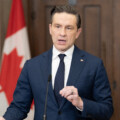Thirty years ago this month, a controversial economics paper was released that challenged one of the core traditions of the Christmas season: the giving of gifts. Is it a purely a utilitarian exercise that can be measured in economic efficiency terms to determine if presents are actually worth the money, time, and effort? Or is there more to the practice beyond what can be measured by economic models?
On the whole, American economist Joel Waldfogel determined that it is not worth it—but some economists are willing to make room for some Christmas spirit.
Waldfogel’s famous paper, “The Deadweight Loss of Christmas”, highlights how holiday gift-giving can lead to a loss of economic utility (or what he referred to as “deadweight loss”) due to misallocation of resources and the potential for waste—when, say, there is a gap between how much a gift costs and how much it is valued by the recipient.
This means, then, that as the calendar ticks closer to Christmas Day, those scrambling to find the perfect gifts for loved ones might be economically better off if they exchanged cash instead of gifts, since each individual would be able to spend their money on items they truly value.
Failing to do so renders it more likely that “the gift will leave the recipient worse off than if she had made her own consumption choice with an equal amount of cash,” writes Waldfogel.
Livio Di Matteo, a contributor to The Hub and a professor of economics at Lakehead University, calls Waldfogel’s article a classic, noting its assertion that holiday gift-giving destroys up to one-third of the value of the gifts. This is no small matter, given that in 2022, Canadians spent about $20 billion on gifts, or about $675 per shopper.
Di Matteo cautions, however, that cash gifts are not necessarily a failsafe against inefficiency. “One might argue that you need to value the utility of the person giving the gift more highly [because he or she gets a benefit in the good feelings of purchasing someone else a gift], in which case the deadweight loss would be reduced or even reversed,” he says. “A pure cash transfer might also come with disutility if the recipient feels it devalues the relationship.”
Brian Dijkema, vice president of external affairs with Cardus, also praises Waldfogel’s article for its economic thinking and notes that he himself enjoys cash gifts.
“That’s really helpful and gets to the heart of economics, which is living a frugal life and trying to do the most with your money,” says Dijkema. “But, like most economic thinking, that takes one aspect of life and makes it the totality of the whole thing.”
He notes that few people live their lives in search of maximum utility, and that there is more to our lives than economizing. “I think Christmas is a classic example of that,” he says. “I’m not Grinch enough to say that there is no meaning in receiving gifts.”
Dijkema also points out that while Christmas is a Christian holiday at its core, consumer marketing in an increasingly irreligious society has created meaning out of buying material things.
“I think for some, it has become what you consume, and the pleasure that it gives you, and I actually think it’s not very healthy,” he says. “The question, then, is, when are we getting gifts today, to what end, and why? I think those things are worth considering as much as the actual buying and selling of them.”

Christopher Ragan, director of the Max Bell School of Public Policy at McGill University, says that in a “cold-hearted economic sense,” holiday gift-giving is very inefficient.
“The most efficient Christmas gift you can give is generalized purchasing power, which is money. The second-most efficient gift is a gift card, and then all you have to do is make sure that they like where the gift card is from,” he says, pointing out that the time and effort that goes into finding the perceived correct gift is also an inefficiency.
However, like Di Matteo and Dijkema, he also argues that boiling down holiday gift-giving to economic calculations ignores the intricacies of human relationships—and the spirit of the holiday.
“I suspect that the spirit of Christmas would probably be enhanced if economists did not talk about efficiency on Christmas Day, or [for] two or three days either before and after,” he says.
Recommended for You

‘It’s the destruction of American leadership’: David Frum breaks down Donald Trump’s ‘Liberation Day’ tariffs plan

‘It doesn’t put out the fire, it makes it worse’: Ian Lee on why retaliatory tariffs aren’t the answer to Canada’s trade war woes

‘We must get to the negotiating table’: Ian Lee on why Canada’s response to Trump’s ‘Liberation Day’ should not include retaliatory tariffs

‘This is a real crisis in our country’: Amanda Galbraith on why Poilievre is right to worry about family fertility




